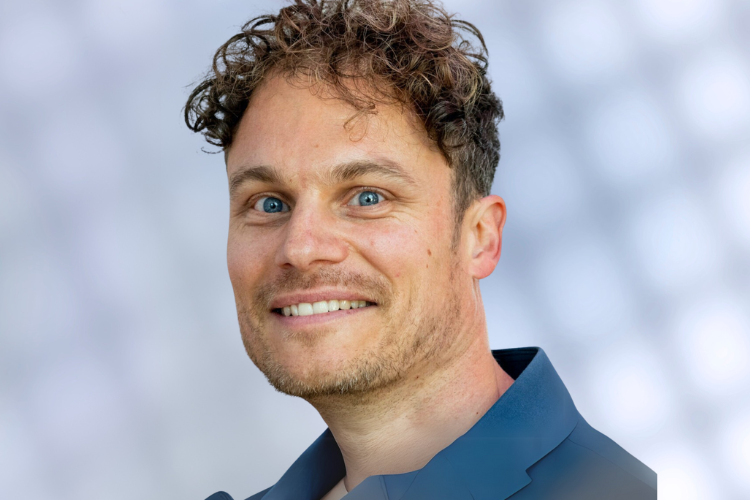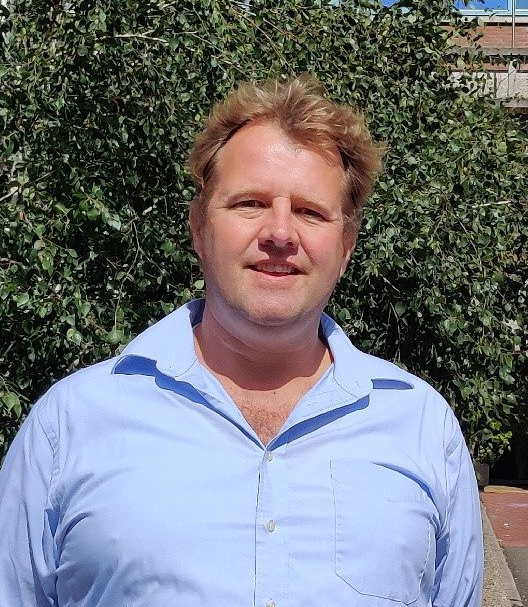In Dutch academia, Principal Investigators (PIs) are challenged to take on leadership roles, establish independent research lines, and gain visibility. Our PIs display scientific vision, build effective research teams, and mentor the next generation of talented researchers. They secure funding to drive discoveries and advance new treatments within the neuroscience field. Amsterdam Neuroscience proudly congratulates the newly appointed PIs of 2025.
Recently appointed by Amsterdam UMC in the Radiology and Nuclear Medicine, Pediatrics, Human Genetics, Neurology, Psychiatry, and Child and Adolescent Psychiatry departments, these fourteen Amsterdam Neuroscience PIs will pursue their research within 7 of the 9 different research programs. Meet our appointed Principal Investigators.
Wissam Beaino
Department: Radiology and Nuclear Medicine
Research Program: Brain Imaging
Wissam Beaino is an Assistant Professor for both Amsterdam Neuroscience and Cancer Center Amsterdam. His research focuses onthe preclinical development and evaluation of innovative PET (positron emission tomography) tracers for imaging various biological targets, and to support drug development, particularly in the field of neurology and oncology. Key areas of his research interest include the evaluation of small molecule PET tracers for imaging neuroinflammation andα-synuclein aggregates, as well as the development of peptide and nanobody-based tracers for imaging PD1 and PD-L1 in cancer. He is also expanding the application of immuno-PET for the evaluation of enhanced brain delivery of biological agents, employing techniques like focused ultrasound and brain-shuttle constructs. Ultimately,his ongoing research seeks to translate these imaging technologies into clinical applications, improving diagnostic accuracy and therapeutic outcomes in oncology and neurodegenerative disorders.
Merijn W. Bijlsma
Department: Pediatrics
Research Program: Neuroinfection & -inflammation
Merijn Bijlsma works as a Pediatrician at Emma Children's Hospital and postdoctoral researcher at the Neuroinfection Center Amsterdam. His research interests include the epidemiology, prevention and long term outcome of bacterial meningitis. His research focus is to develop effective and targeted prevention approaches for sepsis and meningitis in infants. He therefore started the NOGBS prospective nationwide cohort study that investigates GBS colonization and disease. NOGBS has already collected clinical data, blood and bacterial isolates from cases (>500) and controls (>1000).
Amélie Fréal
Department: Human Genetics
Research Program: Cellular & Molecular Mechanisms
Amélie Fréal is Assistant Professor at the department of Human Genetics and at the Center for Neurogenomics and Cognitive Research. Her lab is interested in understanding the molecular mechanisms that allow neurons to adapt their activity level to ensure network homeostasis. Her research focuses on the adaptations occurring at the level of the axon initial segment.
Brigit de Jong
Department: Neurology
Research Program: Neuroinfection & -inflammation
Brigit de Jong is both Neurologist and an Epidemiologist specialized in MS at the MS Center Amsterdam. Her research line focuses on non-pharmacological interventions that determine the clinical outcome and pathogenesis of MS and which biomarkers are useful parameters for disease course and/or therapeutic effect, with cognition and lifestyle as main topics. Her human experience-based research (bench-to-bedside) contributes to knowledge on etiology and evidence-based interventions that ameliorates the impact of MS. In her research and as a clinician De Jong focuses on visible and non-visible (such as cognition and fatigue) MS-related symptoms.
Zoé van Kempen
Department: Neurology
Research Program: Neuroinfection & -inflammation
Zoé van Kempen works as Neurologist and researcher at the MS Center Amsterdam. Her research focuses on the personalization of high-efficacy therapies for relapsing-remitting multiple sclerosis (RRMS). By studying the pharmacokinetics and pharmacodynamics of various monoclonal antibodies, they aim to understand the significant variability in drug metabolism among MS patients. The clinical research of Van Kempen is centered on the adjustment and personalization of these therapies, contributing to their value in terms of safety, treatment convenience, and healthcare efficiency.
Sven van der Lee
Department: Human Genetics
Research Program: Neurodegeneration
Sven van der Lee is a medical doctor and postdoctoral researcher at the department of Human Genetics and the Alzheimer Center Amsterdam. As a researcher, his work focuses on understanding the molecular and cellular mechanisms underlying neurodegenerative diseases. Specifically, Van der Lee is studying the role of genetic and environmental factors in the onset and progression of Alzheimer's disease and other related dementias in families. More recently, he has focused on translating the current knowledge to clinically relevant outcomes for patients. This includes participating and leading genome-wide association studies, facilitating the use of genetic data by other researchers, create and implement novel criteria for genetic testing in dementia and starting a National Biobank to facilitate translational studies and clinical trials.
Anja Lok
Department: Psychiatry
Research Program: Mood, Anxiety, Psychosis, Stress & Sleep
Anja Lok is both Psychiatrist and Psychologist. She has interdisciplinary expertise in the fields of mental health, biological psychiatry, and psychonomics and is fascinated by the changes in mental health over time, especially in adolescents and young adults. Lok her research spans from depressive symptoms to metabolomics to exploring the microbiome as a novel approach to the analysis and modification of mental health. The microbiome operates at the nexus of the exposome and psychobiological functioning. The latter program of research involves discovery, mechanistic, and intervention studies of microbiology in mental health in collaboration with the faculty of Science, Swammerdam Institute of Life Sciences, University of Amsterdam.
Jurjen Luykx
Department: Psychiatry
Research Program: Mood, Anxiety, Psychosis, Stress & Sleep
Jurjen Luykx is Psychiatrist and researcher with a background in psychiatric genetics and an interest in neurobiological, clinical, environmental, and societal issues related to (neuro)psychiatry. Luykx aims is to bridge the gap between research findings and patients with neuropsychiatric disorders in the real world, disseminating new insights through freely accessible and varying portals and media outlets.
Yuri Milaneschi
Department: Psychiatry
Research Programs: Mood, Anxiety, Psychosis, Stress & Sleep & Complex Trait Genetics
Yuri Milaneschi works as Assistant Professor inpsychiatryandepidemiology. His research focuses on the biological and genetic underpinnings of depression pathophysiology, particularly the immuno-metabolic pathways. He has led large-scale epidemiological studies using genomics and metabolomics in depression research and has authored expert reviews on depression, obesity, and the concept of "Immuno-Metabolic Depression."
Tinca Polderman
Department: Child and Adolescent Psychiatry & Psychosocial Care
Research Program: Compulsivity, Impulsivity & AttentionTinca Polderman is Associate Professor in child and adolescent psychiatry. Her work focuses on individual differences in behavior, health and disease, with a specific interest in psychopathological traits, and their often comorbid manifestation. Polderman studies the causes, consequences and impact of disorders and treatment effects, as project leader of a large national collaboration between 4 academic clinical centers, called
DREAMS. In addition, she leads the genetic research line of
The Netherlands Autism Register.
Dirk Smit
Department: Psychiatry
Research Program: Compulsivity, Impulsivity & Attention
Dirk Smit works as Assistant Professor in biological psychology and psychiatry. His research focuses on the intersection of neuroscience and genetics. In the field of neuroscience, Smit uses EEG to study oscillatory activity both in rest state and during tasks. He studies the large-scale properties of the brain networkthat show interlocking oscillations. For the genetic part of his research, Smit investigates whether theEEG measures based on oscillatory activity are genetic.
Jorien Treur
Department: Psychiatry
Research Programs: Complex Trait Genetics & Compulsivity, Impulsivity & Attention
Jorien Treur’s work aims to unravel the mechanisms that lead to comorbidity between different types of (mental) health disorders, especially focusing on causal pathways. Treur has her own research group within the Department of Psychiatry. They uniquely combine different innovative research methods – including genetic, epidemiological, and experimental studies – and triangulate evidence to reliably answer important causal questions in the field of psychiatry.
Camiel Verhamme
Department: Neurology
Research Program: Neuroinfection & -inflammation
Camiel Verhamme is a neurologist and clinical neurophysiologist specializing in neuromuscular disorders. His work focuses on improving the diagnosis and treatment of peripheral nerve and muscle disorders, particularly immune-mediated neuropathies, idiopathic inflammatory myopathies, and hereditary polyneuropathies. His research emphases improving the diagnostic and prognostic yield of neurophysiological techniques, including nerve conduction studies, needle electromyography, nerve & muscle ultrasound, with the support of artificial intelligence.
Alle Meije Wink
Department: Radiology and Nuclear Medicine
Research Program: Brain Imaging
Alle Meije Wink works as Assistant Professor at the Radiology and Nuclear Medicine department. He develops computer software for brain image analysis in multiple languages and environments. Most analyses concern 3-dimensional brain MRI and PET scans. Methods development includes quality testing, preprocessing (e.g.automatic positional alignment) and statistical analysis. With the analysis of brain images, Wink wants to improve the diagnosis and understanding of neurological and psychiatric disorders, like Alzheimer’s disease and MS or in brain tumors. Next to publishing our analysis results for advancing the field, we also publish the methods and share our imaging data sets to facilitate reproducibility and repeatability. Examples are the public EPAD and AMYPAD imaging studies.















